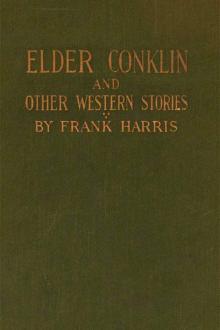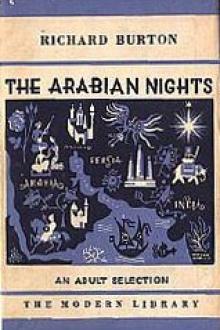Elder Conklin - Frank Harris (i am malala young readers edition .TXT) 📗

- Author: Frank Harris
- Performer: -
Book online «Elder Conklin - Frank Harris (i am malala young readers edition .TXT) 📗». Author Frank Harris
“I see,” said Crocker, with a certain sympathy in his voice, “but you oughter hev waited. You oughter make up to wait from this on, Charley. ‘Tain’t hard. You don’t need to take anythin’ and set under it. I’m not advisin’ that, but it’s stronger to wait before you go fer any one. The boys,” he added significantly, “don’t like a man to bounce, and what they don’t like is pretty hard to do.”
“Damn the boys,” exclaimed Charley vehemently, “they’re all alike out here. I can’t act different. If I waited, I might wait too long—too long, d’you sabe? I just can’t trust myself,” he added in a subdued tone.
“No,” replied Crocker meditatively. “No, p’r’aps not. But see here, Charley, I kinder like you, and so I tell you, no one can bounce the crowd here in Garotte. They’re the worst crowd you ever struck in your life. Garotte’s known for hard cases. Why,” he went on earnestly, as if he had suddenly become conscious of the fact, “the other night Reggitt and a lot came mighty near goin’ fer you—and Harrison, Harrison took up what you said. You didn’t notice, I guess; and p’r’aps ‘twas well you didn’t; but you hadn’t much to spare. You won by the odd card.
“No one can bounce this camp. They’ve come from everywhere, and can only jes’ get a livin’ here—no more. And when luck’s bad they’re”—and he paused as if no adjective were strong enough. “If a man was steel, and the best and quickest on the draw ever seen, I guess they’d bury him if he played your way.”
“Then they may bury me,” retorted Charley bitterly, “but I’ve eaten my share of crow. I ain’t goin’ to eat any more. Can’t go East now with the taste of it in my mouth. I’d rather they buried me.”
And they did bury him—about a fortnight after.
July, 1892.
*
THE BEST MAN IN GAROTTE.
Lawyer Rablay had come from nobody knew where. He was a small man, almost as round as a billiard ball. His body was round, his head was round; his blue eyes and even his mouth and chin were round; his nose was a perky snub; he was florid and prematurely bald—a picture of good-humour. And yet he was a power in Garotte. When he came to the camp, a row was the only form of recreation known to the miners. A “fuss” took men out of themselves, and was accordingly hailed as an amusement; besides, it afforded a subject of conversation. But after Lawyer Rablay’s arrival fights became comparatively infrequent. Would-be students of human nature declared at first that his flow of spirits was merely animal, and that his wit was thin; but even these envious ones had to admit later that his wit told, and that his good-humour was catching.
Crocker and Harrison had nearly got to loggerheads one night for no reason apparently, save that each had a high reputation for courage, and neither could find a worthier antagonist. In the nick of time Rablay appeared; he seemed to understand the situation at a glance, and broke in:
“See here, boys. I’ll settle this. They’re disputin’—I know they are. Want to decide with bullets whether ‘Frisco or Denver’s the finest city. ‘Frisco’s bigger and older, says Crocker; Harrison maintains Denver’s better laid out. Crocker replies in his quiet way that ‘Frisco ain’t dead yet.” Good temper being now reestablished, Rablay went on: “I’ll decide this matter right off. Crocker and Harrison shall set up drinks for the crowd till we’re all laid out. And I’ll tell a story,” and he began a tale which cannot be retold here, but which delighted the boys as much by its salaciousness as by its vivacity.
Lawyer Rablay was to Garotte what novels, theatres, churches, concerts are to more favoured cities; in fact, for some six months, he and his stories constituted the chief humanizing influence in the camp. Deputations were often despatched from Doolan’s to bring Rablay to the bar. The miners got up “cases” in order to give him work. More than once both parties in a dispute, real or imaginary, engaged him, despite his protestations, as attorney, and afterwards the boys insisted that, being advocate for both sides, he was well fitted to decide the issue as judge. He had not been a month in Garotte before he was christened Judge, and every question, whether of claim-boundaries, the suitability of a nickname, or the value of “dust,” was submitted for his decision. It cannot be asserted that his enviable position was due either to perfect impartiality or to infallible wisdom. But every one knew that his judgments would be informed by shrewd sense and good-humour, and would be followed by a story, and woe betide the disputant whose perversity deferred that pleasure. So Garotte became a sort of theocracy, with Judge Rablay as ruler. And yet he was, perhaps, the only man in the community whose courage had never been tested or even considered.
One afternoon a man came to Garotte, who had a widespread reputation. His name was Bill Hitchcock. A marvellous shot, a first-rate poker-player, a good rider—these virtues were outweighed by his desperate temper. Though not more than five-and-twenty years of age his courage and ferocity had made him a marked man. He was said to have killed half-a-dozen men; and it was known that he had generally provoked his victims. No one could imagine why he had come to Garotte, but he had not been half an hour in the place before he was recognized. It was difficult to forget him, once seen. He was tall and broad-shouldered; his face long, with well-cut features; a brown moustache drooped negligently over his mouth; his heavy eyelids were usually half-closed, but when in moments of excitement they were suddenly updrawn, one was startled by a naked hardness of grey-green eyes.
Hitchcock spent the whole afternoon in Doolan’s, scarcely speaking a word. As night drew down, the throng of miners increased. Luck had been bad for weeks; the camp was in a state of savage ill-humour. Not a few came to the saloon that night intending to show, if an opportunity offered, that neither Hitchcock nor any one else on earth could scare them. As minute after minute passed the tension increased. Yet Hitchcock stood in the midst of them, drinking and smoking in silence, seemingly unconcerned.
Presently the Judge came in with a smile on his round face and shot off a merry remark. But the quip didn’t take as it should have done. He was received with quiet nods and not with smiles and loud greetings as usual. Nothing daunted, he made his way to the bar, and, standing next to Hitchcock, called for a drink.
“Come, Doolan, a Bourbon; our only monarch!”
Beyond a smile from Doolan the remark elicited no applause. Astonished, the Judge looked about him; never in his experience had the camp been in that temper. But still he had conquered too often to doubt his powers now. Again and again he tried to break the spell—in vain. As a last resort he resolved to use his infallible receipt against ill-temper.
“Boys! I’ve just come in to tell you one little story; then I’ll have to go.”
From force of habit the crowd drew towards him, and faces relaxed. Cheered by this he picked up his glass from the bar and turned towards his audience. Unluckily, as he moved, his right arm brushed against Hitchcock, who was looking at him with half-opened eyes. The next moment Hitchcock had picked up his glass and dashed it in the Judge’s face. Startled, confounded by the unexpected suddenness of the attack, Rablay backed two or three paces, and, blinded by the rush of blood from his forehead, drew out his handkerchief. No one stirred. It was part of the unwritten law in Garotte to let every man in such circumstances play his game as he pleased. For a moment or two the Judge mopped his face, and then he started towards his assailant with his round face puckered up and out-thrust hands. He had scarcely moved, however, when Hitchcock levelled a long Navy Colt against his breast:
“Git back, you –- “
The Judge stopped. He was unarmed but not cowed. All of a sudden those wary, long eyes of Hitchcock took in the fact that a score of revolvers covered him.
With lazy deliberation Dave Crocker moved out of the throng towards the combatants, and standing between them, with his revolver pointing to the ground, said sympathetically:
“Jedge, we’re sorry you’ve been jumped, here in Garotte. Now, what would you like?”
“A fair fight,” replied Rablay, beginning again to use his handkerchief.
“Wall,” Crocker went on, after a pause for thought. “A square fight’s good but hard to get. This man,” and his head made a motion towards Hitchcock as he spoke, “is one of the best shots there is, and I reckon you’re not as good at shootin’ as at—other things.” Again he paused to think, and then continued with the same deliberate air of careful reflection, “We all cotton to you, Jedge; you know that. Suppose you pick a man who kin shoot, and leave it to him. That’d be fair, an’ you kin jes’ choose any of us, or one after the other. We’re all willin’.”
“No,” replied the Judge, taking away the handkerchief, and showing a jagged, red line on his forehead. “No! he struck me. I don’t want any one to help me, or take my place.”
“That’s right,” said Crocker, approvingly; “that’s right, Jedge, we all like that, but ‘tain’t square, and this camp means to hev it square. You bet!” And, in the difficult circumstances, he looked round for the approval which was manifest on every one of the serious faces. Again he began: “I guess, Jedge, you’d better take my plan, ‘twould be surer. No! Wall, suppose I take two six-shooters, one loaded, the other empty, and put them under a capote on the table in the next room. You could both go in and draw for weapons; that’d be square, I reckon?” and he waited for the Judge’s reply.
“Yes,” replied Rablay, “that’d be fair. I agree to that.”
“Hell!” exclaimed Hitchcock, “I don’t. If he wants to fight, I’m here; but I ain’t goin’ to take a hand in no sich derned game—with the cards stocked agen me.”
“Ain’t you?” retorted Crocker, facing him, and beginning slowly. “I reckon you’ll play any game we say. See! any damned game we like. D’ye understand?”
As no response was forthcoming to this defiance, he went into the other room to arrange the preliminaries of the duel. A few moments passed in silence, and then he came back through the lane of men to the two combatants.
“Jedge,” he began, “the six-shooters are there, all ready. Would you like to hev first draw, or throw for it with him?” contemptuously indicating Hitchcock with a movement of his head as he concluded.
“Let us throw,” replied Rablay, quietly.
In silence the three dice and the box were placed by Doolan on the bar. In response to Crocker’s gesture the Judge took up the box and rolled out two fives and a three—thirteen. Every one felt that he had lost the draw, but his face did not change any more than that of his adversary. In silence Hitchcock replaced the dice in the box and threw a three, a four, and a two—nine; he put down the box emphatically.
“Wall,” Crocker decided impassively, “I guess that gives you the draw, Jedge; we





Comments (0)